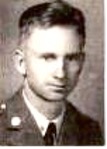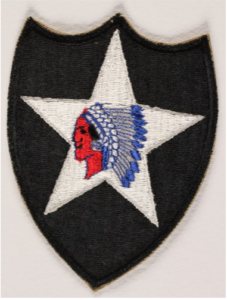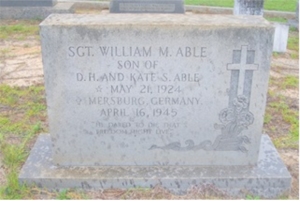Scroll of Honor – William Mathew Able
Career Cut Short
Written by: Kelly Durham
William Mathew Able, an agriculture/animal husbandry major from Saluda, arrived on campus  with the other boys in the Class of 1945, the last cohort of cadets to enroll at Clemson College before America went to war. Able and his class would have their days on campus curtailed by America’s expanding need for men to fight the global war.
with the other boys in the Class of 1945, the last cohort of cadets to enroll at Clemson College before America went to war. Able and his class would have their days on campus curtailed by America’s expanding need for men to fight the global war.
At the end of the 1942-43 academic year, the War Department decreed that cadets who had completed their junior years of college would go directly into the military. Those who performed well in basic training were afforded the opportunity to advance to Officer Candidate Schools. Freshman and sophomore cadets, like Able, were drafted and sent to basic training.
Able entered military service on June 30, 1943. US forces were fighting in the Pacific and in the Mediterranean and the American military was growing at a fantastic rate as the nation grappled with the manpower and equipment demands of a world-wide conflict.  Able went to Fort McClellan, Alabama, a post familiar to hundreds of Clemson cadets who, in more peaceful days, had completed ROTC summer training there.
Able went to Fort McClellan, Alabama, a post familiar to hundreds of Clemson cadets who, in more peaceful days, had completed ROTC summer training there.
Able trained to become a machine gunner. In January 1944, Able shipped overseas and was assigned to M Company, 23rd Infantry Regiment, 2nd Infantry Division then training in the United Kingdom for the eventual invasion of Europe.
On June 7, 1944, the day after D-Day, Able and his comrades crossed the English Channel and landed on Omaha Beach. Quickly, the division was committed to the attack, crossing the Aure River on June 10 and liberating Trévières. The division then assaulted Hill 192, a key enemy strong point on the route to the vital road junction of Saint Lo. Following a stint in defensive positions, the division was again committed to the attack in order to exploit the breakout of American forces around Saint Lo. The division attacked in the vicinity of Vire on August 4. During this action, Able was wounded in the leg and evacuated to an Army hospital in England. For exceptional meritorious service against the enemy from July 6 to August 6, 1944, Able was awarded the Bronze Star. He was also awarded the Purple Heart.
For five months, Sergeant Able rested and recuperated in the hospital. By the time he returned to his unit in January 1945, the Germans had exhausted themselves in their final offensive, the Battle of the Bulge. But, the work of the 2nd Infantry Division was not complete. In February, the division resumed the offensive, recapturing ground lost during the Battle of the Bulge. Able’s division reached the Rhine River on March 9 and from the 12th to the 20th helped guard the key bridge over the Rhine at Remagen. The division crossed the Rhine on March 21 and relieved the 9th Armored Division at Limburg an der Lahn, Germany. From there, in the face of collapsing German resistance, the division swept to the east, capturing Göttingen on April 8 and
establishing a bridgehead over the Saale River on the 14th. Two days later, as the division  battled to capture Merseburg, Able was killed in action. The Germans would surrender just three weeks afterwards.
battled to capture Merseburg, Able was killed in action. The Germans would surrender just three weeks afterwards.
Able was survived by his wife, the former Mildred Barnes, his parents, two sisters, and one brother. After the war, his remains were returned to Saluda and buried at the Butler Methodist Church cemetery.
For more information about William Mathew Able, see: https://soh.alumni.clemson.edu/scroll/william-mathew-able/
For additional information about Clemson University’s Scroll of Honor, visit: https://soh.alumni.clemson.edu/
